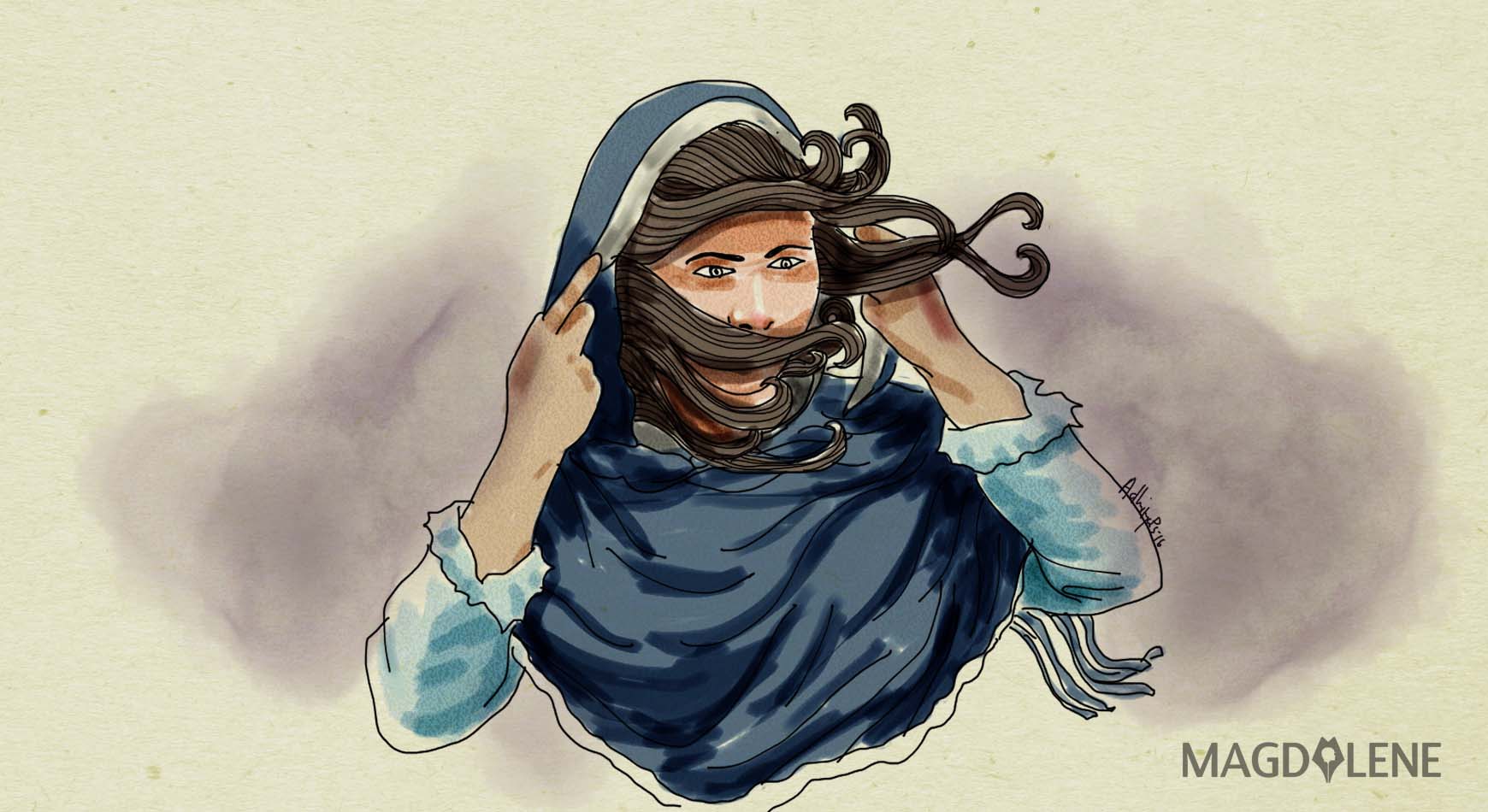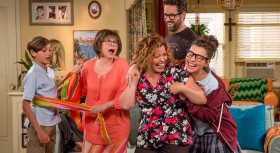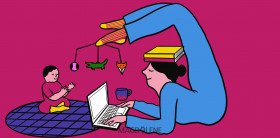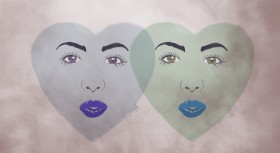If I explode right here and right now, would you hear it?
Would you see my dust and ashes, would you bury it?
Pain naturally makes people scream, but the deepest, most dangerous kind of pain will leave you silent. I had been silent until very recently about my decision in 2012 to remove the hijab, exposing my hair to public for the first time since puberty. Nobody had expected this. I was not the woman my parents warned me against – until I was.
People assume decisions like this are made overnight, because of how abrupt they seem. But I spent some years thinking about it before I finally had the guts to show my hair again. This is often the case with ex-hijabis. Contrary to the popularly held view that casts us as misguided, lost, and even bimbo-like, we understand upfront the ramifications of our decision. The shock, the questions, the judgments.
“Muslim women are taking off the hijab because … they want to feel young and pretty and desirable,” wrote a woman blogger on Muslimworlds.com. I choked the first time I read it. The sentence stung. Like all Muslim and ex-Muslim women who have stripped their hair bare again, I understand too well that this twisted perception belongs not only to her, but also thousands of other Muslims, including the many people I love and care about.
To cover up is easy, to take your hijab off is hard. You would never fully grasp what that means until you become one of us.
When I first committed to wearing the hijab, I was no more than a little girl, zealous and anxious to please Allah. I never harbored an innocent crush on pop heartthrobs or boys at school – God alone was my first love. What happened afterwards was a story you have heard too often before: the girl grew up and lost her faith.
I was in tenth grade when I realized I could no longer disregard my doubts about religion and the concept of divinity. My trip to faithlessness was private and lonesome – I talked to God but the sky was empty.
But even after my belief collapsed I still put efforts to cover my hair. I did it mainly as a duty to my family, a nod of respect to my parents, and an attempt to fulfill, at least from the outside, the society’s perception of a “good girl”. I did the best thing a young woman could do: to obey, to do what she is told.
I succeeded briefly, before spiraling into a horrible form of dehumanizing insanity.
During the months I was literally deranged, I would walk alone for 10, 15 kilometers at ungodly hour, talking to myself. I screamed at the top of my lungs next to busy streets and cried all the time at stupid places: in campus, during classes, on a sofa at a corner in Pizza Hut. The mismatch between what was on my head and what really underwent inside it proved to be too much. I would look at myself in the mirror and despised what I saw. Everywhere I went I would feel like a big, fat lie.
The de-conversion was not the only event that threw me off-center. At around the same time, following a boyfriend’s suggestion to start an open relationship, I began dating other guys and discovered sexuality in ways that were shocking, guilt-inducing, and, at times, non-consensual. Like many other girls, I regarded sex not as something to do, but rather something to give. In the end, even the more pleasurable experiences would leave me feeling enormously empty.
It did not help that I was always an intense person.
“Why would it matter that I stay alive? What difference would I make? Would it be different at all, even?” I remember being 3 years old and completely devastated by these questions. One afternoon, I decided I had had enough, walked out of my home and stopped myself in the middle of a street -- waiting for any fast moving object to hit me.
To cover up is easy, to take your hijab off is hard. You would never fully grasp what that means until you become one of us.
Suicide and suicide attempts among children are extremely rare. Having no one to share this experience with, I grew up feeling not only isolated, but also horrified of my own mind. Thus began my lifelong habit of suppressing my own emotions and thoughts.
The suppressing easily left me with a fragile sense of self. Instead of looking inward, I used my relationships – with God, my parents, the society at large, my boyfriend – to construct my entire identity. Beyond this arrangement, as my own person, I did not exist. So when these relationships crumbled almost all at once, my plunge to insanity was only inevitable.
Shortly after my meltdown my parents sent me into therapy. I did not remember much of it – forgetting is the easiest when you are crazy. But I do remember trying to restore my faith in God. Partly due to my therapist’s advice, but mostly because I saw my dad sobbing and it was the worst thing ever.
I became desperate to “fix” myself, to return to normalcy like everybody else. And if religion has saved so many people, why wouldn’t it save me?
So I shut my eyes, curled into a fetal position, and murmured against the thoughts of literal self-destruction and severe existential crises: “PLEASE GOD MAKE IT STOP PLEASE GOD MAKE IT STOP PLEASE GOD MAKE IT STOP.” I prayed until I fell asleep.
Of course the prayers did not cancel any of my dark thoughts. And since the main cause of my madness was the absence of “the self”, the only way for me to address it was to finally understand who I really was. And one of the things I immediately understood about myself was my wish to quit wearing the hijab.
Facebook was a convenient way to come out to your family and friends. Take a nice picture of yourself showing your hair, caption it with a smile, and make it your profile picture. Expect people to comment on how you look “different”. Expect even a few messages in your inbox.
Because most of my closest friends had witnessed my madness, they were polite about my decision to no longer wear the hijab. But their curiosity remained. And since I was very silent (come on now, do I have to explain every single thing I did to my own body?), they came up with very creative explanations.
“We thought it was because you broke up.”
“We wondered if maybe you wanted to become more fashionable.”
“I mean, you went on exchange to Belgium, right, after all those psychiatric nightmares? So people did ask me, and I could not shake the idea from my head either: now that you live in Europe, you decided to hide your Muslim identity?”
I always laughed these comments off because it would be inappropriate to say, “Wearing the hijab made me go clinically insane and/or want to kill myself. Also, I’m an atheist.” But laughing never satisfies people’s curiosity. So even until today (and especially today, now that I look much more emotionally stable compared to three years ago) people still ask why my hair is out in the open. If I had a penny for every time I heard “You know hijab is an obligation?”/”The heat of the day is nothing compared to hellfire!”/ “But you look so pretty with your hijab on!”, I’d have more money than Mark Zuckerberg and the Arab princes combined, and I’d be more powerful than the Illuminati.
The most difficult thing is to do this despite my parents. My dad is a local ustad (Muslim scholar), and my mom wears a long hijab that resembles a chador. No one has to tell me I am a walking embarrassment to my parents; I am very aware of this.
My mother always found ways to nudge me into covering my hair again. She even asked my friends to help her on this. And because I did not want to start a debate with her, I always tried to remain composed. That was before she said I should wear the hijab beneath my toga cap, when I invited her to my graduation.
I did not tell her about my lack of belief – that would have been too much – but I did open up for the first time about my history of sexual abuse.
“I cannot have people telling me what to do and what not to do with my body anymore,” my hands trembled as I typed the words.
I never received her replies. We never spoke about it again. When she attended my graduation two months afterwards, we didn’t take any picture together.
Today, I am not deranged anymore, but I am still very, very sad. I regret how disappointed people can be when they see my hair. I regret having to explain over and over again why I took off my hijab.
I am still in therapy, and there are times when only Prozac and Clobazam could carry me through. But I have stopped wanting to be fixed, have quit wishing to be “normal”. My emotions are under control and that is enough. If this is who I am, if this is all that I will be, I will make the most of it.
Some days I am still casually asked about my hair. My response would depend on the person I happen to speak to. Sometimes I will just laugh it off: hijab is so powerful an identity, it remains who I am even when I no longer wear it.
On grimmer days, I would think of Ophelia, that one character from Hamlet who speaks to me the most. The dutiful daughter, the hopeless lover, the one whose entire world is defined by her relationships with her father and brother and significant other. The embodiment of cherished femininity who eventually goes insane and drowns, beautifully, in a river.
Well, I would say, fuck that. I am not going to fucking drown myself.
I grieve for the girl I once was, and the woman I will never be. But I will not drown. The little sentence has become my mantra, through some perpetual sadness that demands not to be understood, but acknowledged, respected. I will not drown. I will not drown. I will not drown.
Read Aulia’s piece on using the “Salaam” as a catcall.
Aulia Rizda Kushardini (@AuliaKdini) recently graduated from Universitas Gadjah Mada. She lives in Jakarta and Yogyakarta.








Comments